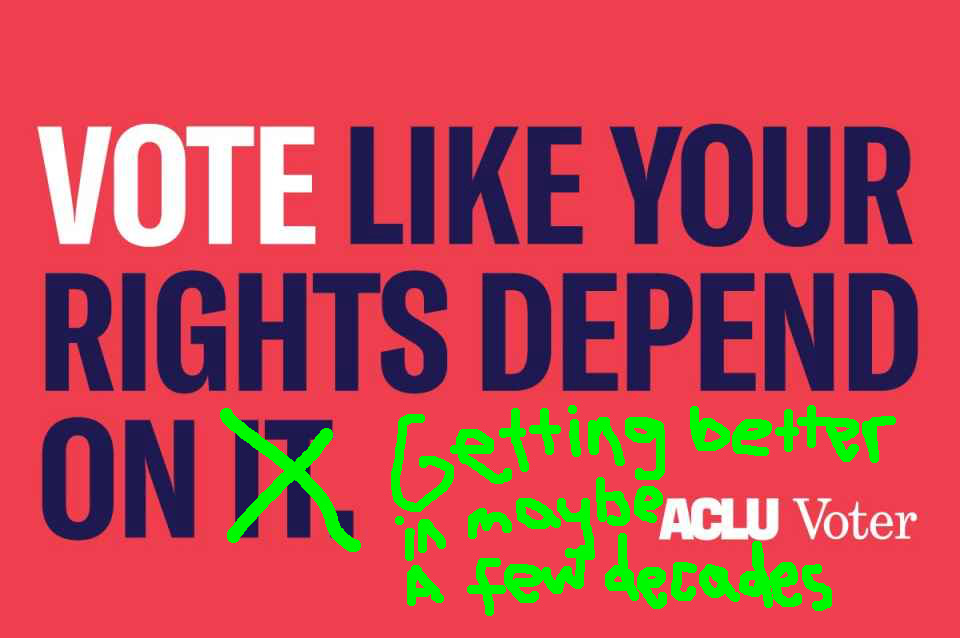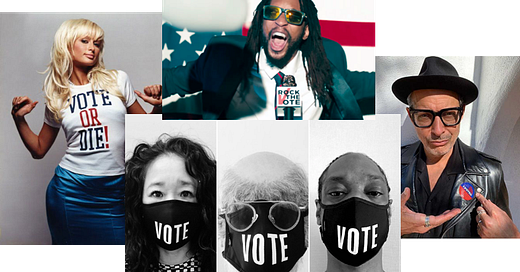Rock de vote, de vanana vote
Voting plays a large role in the ongoing evolution of the U.S. But branding voting as a cure-all constrains the way to progress.
A quick note: I’m still running my promotion to get new subscribers. For each new member of Brands Mean a Lot between now and November 10th, I’ll be donating $5 to The Doe Fund.
The more things change
The federal minimum wage was last raised in 2009. It increased from $6.55/hr to $7.25/hr. Today, the minimum wage is still $7.25/hr. If the minimum wage were indexed to inflation, that $7.25/hr in 2009 would be close to $9/hr today.

The chart above tracks the number of U.S. Armed Forces personnel in Afghanistan from 2007 through 2017. As it stands, there are roughly 8,600 troops in Afghanistan. The war there has lasted nearly 20 years with ambiguous results. The only certainty is that the war has lasted.
Dating back to the establishment of this country, (data first came available in 1965) until the present, the poverty rate for Blacks and Hispanics in the U.S. has been multiples higher than that of whites. At the current moment, where the gap is the smallest, it’s more than twice that of Whites.

Source: U.S. Census Bureau
Democracy Fixer Elixir
Every election cycle there’s a deluge of advertisements and statements encouraging us to vote. From the ACLU to Bank of America, and from Barack Obama to Paris Hilton, we’re urged to do our civic duty so that our voices can be heard.
Many of these same statements emphasize not just voting, but that the act itself can bring forth significant progress or prevent greater harm to the country. In these instances, voting is branded as a cure-all for many of our country’s ailments. With the possible re-election of Donald Trump, this theme has taken on a heightened tone.

Trump stands for this bad thing, Mitch McConnell that bad thing, and Ted Cruz the other bad thing. Want to eliminate those bad things? Vote.
This quote from Jennifer Aniston’s Instagram nicely encapsulates how voting is branded as panacea, a 180-degree turn on our current trajectory, to a wide audience (it garnered 3.7 million likes):
Every cohort mentioned in this paragraph was at-risk pre-Trump. Their equal rights and freedom of opportunity now only nominally granted under the law took decades, if not centuries, to achieve. It will remain this way with whatever leadership comes next.
Can we vote the pain away?
From a national perspective, there are issues that require attention that have remained unchanged or substantially unaltered for decades, if not longer. Branding voting—especially at an executive and congressional level—as a cure-all for issues is therefore harmful.
Doing so encourages complacency and slows momentum. Framing a vote as a singular necessary act that will fix an issue means there’s no follow up required. For Democrats, in this round of elections, the focus is almost squarely on voting out Trump and winning the Senate. For many, that act lends itself to the idea of not having to hear news each day of something absurd the president’s done, or some arbitrarily pernicious policy decision being made.

Pictured: Will brunch return if Biden is elected!?
If it’s not obvious by now, many of those issues—the reasons for the BLM movement, our awful healthcare, our rapidly degrading environment, our punitive policies on rehabilitation and social welfare—existed well before Trump and will persist well after.
For Millennials and Gen-Z, there is more widespread support for reform to the above issues than at any other point in their lifetimes.
If voting-as-a-salve is to be believed, no further work needs to be done on those topics should the election go the way of those who oppose Republicans.
Sweet nothings
On the campaign trail, Democratic candidates Biden and Harris have already staunchly defended the status quo on major issues. For example, on fracking, a method for oil and gas extraction that has far greater costs than benefits, Kamala Harris stated at the VP debate:
"The American people know that Joe Biden will not ban fracking."
In this week’s Presidential debate, Joe Biden ardently defended private insurance, a system that plays an outsized role in the US ranking the lowest of all developed nations in preventing avoidable deaths:
“The idea that I want to eliminate private insurance—the reason why I had such a fight with 20 candidates for the nomination, was I support private insurance.”
Policies, not people
Rather than brand voting as a whimsical medicine for our ails, we’d be better served to focus on the ways in which it impacts issues that matter to us. This approach would put greater emphasis on progress and re-shape policymaking as an ongoing process for those that have been lead to believe it only occurs every election year.
Essentially, voting should be re-branded as a fresh beginning. With every newly elected or re-elected official, we’re granted an opportunity to push them harder towards progress.
🗳🗳If you liked it, share with your friends
👍👍 Had a taste and want more (once a week)?
Song of the week: Something about how a father passing along his awful traits resonates with the way issues are passed from generation to generation. “A Little Soul” from Pulp:






Get out the vote takes on new meaning, necessary but not necessarily effective.